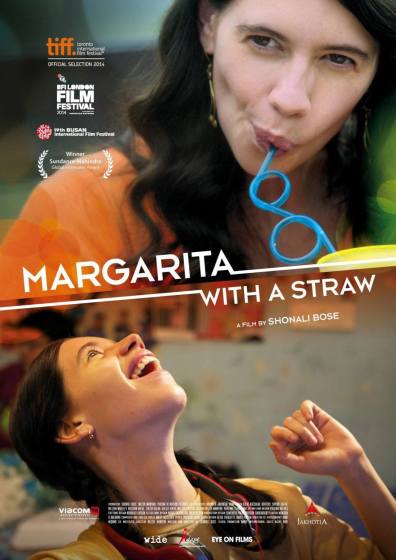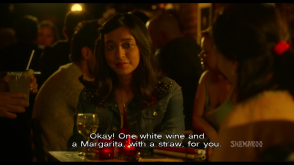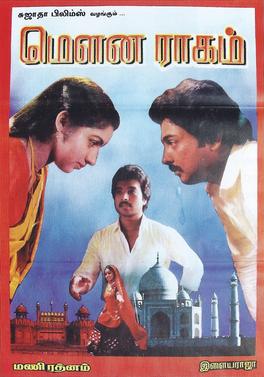
Shonali Bose’s 2014 film follows Laila (Kalki Koechlin) as she navigates her way through the usual rites of passage that mark the transition to adulthood. The difference here is that Laila has cerebral palsy and spends most of her time in a wheelchair. It’s rare to find a story about a disabled protagonist that’s not about overcoming great adversity, but Margarita with a Straw is simply a look at Laila’s life as she navigates her way through college. Laila may have some physical limitations, but her dreams and desires are those of any young person and she doesn’t let her disability stand in her way as she moves to New York to go to college, embarks on a same-sex relationship and starts to take control of her life. The film does have a few flaws, but with strong performances from Kalki Koechlin and Revathy, and a generally upbeat approach, it’s definitely well worth a watch.
Bose based her story on her cousin who also has cerebral palsy and the film was made in consultation with an Indian based disability agency, ADAPT which ensures the situations seem true to life. The issues Laila faces are mainly due to problems with accessibility, such as when the lift at her college isn’t working and she needs to be carried upstairs, or when her wheelchair gets bogged down in the snow in New York. For the most part Laila is a regular student and her family encourage her independence, seeing her disability as just part of Laila rather than as a liability that will hold her back.
Laila is a student at college in Delhi where she has a number of friends. Sameera (Shuchi Dwivedi) plays guitar for a rock band and Laila writes lyrics for their songs, partly because she loves music but she also has a crush on the lead singer Nima (Tenzin Dalha). However, when she reveals her attraction, his awkward response devastates Laila to the point where she feels she cannot continue at college. Luckily for her, at this point she receives an offer to study in New York and over the objections of her father, but with the support of her mother, Laila moves to the US and a new chapter in her life.
While at home Laila experimented with her developing sexuality, including surfing pornographic websites, masturbating and becoming intimate with her friend Dhruv (Hussain Dalal) who is also in a wheelchair. All of this is shown in a very matter of fact way and I can’t remember any Indian film dealing with developing sexuality in such a realistic manner, let alone one that approaches it from the viewpoint of someone with a disability. The film deserves recognition for that as well as the authentic manner in which the friends interact. Dhruv broaches the idea that Laila has ‘normal’ friends simply to try and ‘fit in’, but Bose shows her isolation as the group chat and jam outside while Laila is left alone inside in her wheelchair. These scenes are sensitively handled without ever showing Laila as self-pitying or becoming overly sentimental, which makes the situations realistic and plausible. Also well done is the reaction of Nima when faced with Laila’s attraction which seems completely typical of any adolescent when faced with a declaration of love from someone they like, but are not attracted to in a romantic way. Although these are small moments, the film is made up of many such scenes which ensure the story is about Laila and not about her disability.
Laila’s move to New York brings her into contact with an attractive fellow student Jared (William Mosely) but this time Laila is more careful after her experiences with Nima despite Jared’s seeming interest in her. However, Laila then meets Khanum (Sayani Gupta) after getting mixed up in a demonstration and their friendship develops into an intimate relationship. Khanum is blind and Sayani Gupta is good in her portrayal of someone who cannot see, but unfortunately for the most part, her character is superficial and poorly developed. Khanum appears to exist only as a means to allow Laila to explore her independence, and their relationship generally feels clunky and odd.
The film is most successful in exploring the family relationships, particularly Laila’s relationship with her mother (Revathy). Laila’s desire for independence and privacy ensures there are moments of conflict, while Revathy is excellent as a mother trying to reconcile her need to protect her daughter with the realisation that Laila needs space to grow. Towards the latter half of the film Bose tries to cram too much in to this relationship including an unnecessary illness and a rather forced scene where Laila reveals her bisexuality to her mother, but where she keeps it simple it makes for some excellent and emotional cinema.
Kalki Koechlin does an amazing job with her portrayal of someone with cerebral palsy although it does seem a shame that there wasn’t a disabled actor playing the role. The level of disability she portrays does fluctuate a little throughout the film, but overall her body language is good and convincing while the emotional highs and lows are well done. My DVD includes a ‘making of’ which does give some insights into the difficulty of portraying the character, and it’s to Kalki’s credit that she has invested so much time into getting her characterisation of Laila right. Revathy is also excellent while the rest of the supporting cast are also good. Kuljeet Singh doesn’t have much to do as Laila’s father, but he is fantastic in the emotional scenes near the end and really impresses by how well he conveys strong emotions so subtly.
Overall, Margarita, With a Straw is an unconventional film that may be a tad uneven but succeeds due to the excellent performances and strong emotional content. Bose paints a sympathetic picture of a young woman with cerebral palsy without dwelling on the disability, but rather focusing on the issues that everyone faces as an adolescent, whether able-bodied or not. Laila’s journey towards acceptance, by her family and by herself, is often funny, frequently emotional but always engaging. 4 stars.





















































































